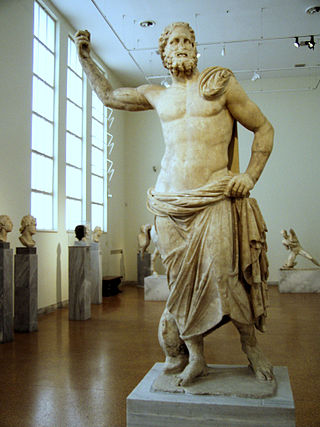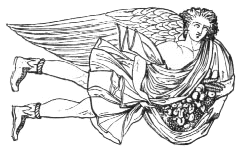Related Research Articles

In ancient Greek religion and mythology, Demeter is the Olympian goddess of the harvest and agriculture, presiding over crops, grains, food, and the fertility of the earth. Although she is mostly known as a grain goddess, she also appeared as a goddess of health, birth, and marriage, and had connections to the Underworld. She is also called Deo. In Greek tradition, Demeter is the second child of the Titans Rhea and Cronus, and sister to Hestia, Hera, Hades, Poseidon, and Zeus. Like her other siblings but Zeus, she was swallowed by her father as an infant and rescued by Zeus.

Hades, in the ancient Greek religion and mythology, is the god of the dead and the king of the underworld, with which his name became synonymous. Hades was the eldest son of Cronus and Rhea, although this also made him the last son to be regurgitated by his father. He and his brothers, Zeus and Poseidon, defeated their father's generation of gods, the Titans, and claimed joint rulership over the cosmos. Hades received the underworld, Zeus the sky, and Poseidon the sea, with the solid earth available to all three concurrently. In artistic depictions, Hades is typically portrayed holding a bident and wearing his helm with Cerberus, the three-headed guard-dog of the underworld, standing at his side.
Hecate is a goddess in ancient Greek religion and mythology, most often shown holding a pair of torches, a key, or snakes, or accompanied by dogs, and in later periods depicted as three-formed or triple-bodied. She is variously associated with crossroads, entrance-ways, night, light, magic, protection from witchcraft, the Moon, knowledge of herbs and poisonous plants, graves, ghosts, necromancy, and sorcery. Her earliest appearance in literature was in Hesiod's Theogony in the 8th century BCE as a goddess of great honour with domains in sky, earth, and sea. Her place of origin is debated by scholars, but she had popular followings amongst the witches of Thessaly and an important sanctuary among the Carian Greeks of Asia Minor in Lagina. Her oldest known representation was found in Selinunte, in Sicily.

Poseidon is one of the Twelve Olympians in ancient Greek religion and mythology, presiding over the sea, storms, earthquakes and horses. He was the protector of seafarers and the guardian of many Hellenic cities and colonies. In pre-Olympian Bronze Age Greece, Poseidon was venerated as a chief deity at Pylos and Thebes, with the cult title "earth shaker"; in the myths of isolated Arcadia, he is related to Demeter and Persephone and was venerated as a horse, and as a god of the waters. Poseidon maintained both associations among most Greeks: He was regarded as the tamer or father of horses, who, with a strike of his trident, created springs. His Roman equivalent is Neptune.

In ancient Greek mythology and religion, Persephone, also called Kore or Cora, is the daughter of Zeus and Demeter. She became the queen of the underworld after her abduction by and marriage to her uncle Hades, the king of the underworld.

The Eleusinian Mysteries were initiations held every year for the cult of Demeter and Persephone based at the Panhellenic Sanctuary of Eleusis in ancient Greece. They are considered the "most famous of the secret religious rites of ancient Greece". Their basis was an old agrarian cult, and there is some evidence that they were derived from the religious practices of the Mycenean period. The Mysteries represented the myth of the abduction of Persephone from her mother Demeter by the king of the underworld Hades, in a cycle with three phases: the descent (loss), the search, and the ascent, with the main theme being the ascent of Persephone and the reunion with her mother. It was a major festival during the Hellenic era, and later spread to Rome. Similar religious rites appear in the agricultural societies of the Near East and in Minoan Crete.

In Greek mythology, Astraeus or Astraios is an astrological deity. Some also associate him with the winds, as he is the father of the four Anemoi, by his wife, Eos.

In Greek mythology, Metanira or Meganira was a queen of Eleusis as wife of King Celeus. She was the daughter of Amphictyon, the king of Athens.

In ancient Greek religion and Greek mythology, Minthe is an Underworld Naiad nymph associated with the river Cocytus. She was beloved by Hades, the King of the Underworld, and became his mistress, but she was transformed into a mint plant by either his wife Persephone or her mother Demeter. The plant was also called by some as hedyosmos, which means "sweet-smelling".

Baubo is a minor figure in Greek mythology who does not appear in surviving sources before the fourth century CE. A fragment from Asclepiades of Tragilus states that she is the wife of Dysaules, who was said to be autochthonous, that they had two daughters - Protonoe und Nisa - and that the couple welcomed Demeter into their house.

Mother Nature is a personification of nature that focuses on the life-giving and nurturing aspects of nature by embodying it, in the form of the mother.

Class of the Titans is a Canadian animated television series produced by Studio B Productions and Nelvana Limited. It premiered on December 31, 2005, at 5 pm ET/PT on Teletoon with a special 90-minute presentation of the first three episodes. The series aired in the United States on Qubo from September 19, 2009, to October 24, 2009. On April 1, 2012, the series returned to Qubo as part of its Qubo Night Owl block replacing "Spliced" where it remained until July 25, 2020.

Virgo (♍︎) is the sixth astrological sign in the zodiac. It spans the 150–180th degree of the zodiac. Under the tropical zodiac, the Sun transits this area between August 23 and September 22. Depending on the system of astrology, individuals born during these dates may be called Virgos or Virgoans.
Melinoë is a chthonic nymph or goddess invoked in one of the Orphic Hymns and represented as a bringer of nightmares and madness. The name "Melinoë" also appears on a metal tablet in association with Persephone. In the hymn, Melinoë has characteristics that seem similar to Hecate and the Erinyes, and Melinoë's name is sometimes thought to be an epithet of Hecate. The terms in which Melinoë is described are typical of moon goddesses in Greek poetry.
Persephone, the daughter of Zeus and Demeter in Greek mythology, appears in films, works of literature, and in popular culture, both as a goddess character and through the symbolic use of her name. She becomes the queen of the underworld through her abduction by Hades, the god of the underworld. The myth of her abduction represents her dual function as the as chthonic (underworld) and vegetation goddess: a personification of vegetation, which shoots forth in Spring and withdraws into the earth after harvest. Proserpina is the Roman equivalent.

Despoina or Despoena was the epithet of a goddess worshiped by the Eleusinian Mysteries in Ancient Greece as the daughter of Demeter and Poseidon and the sister of Arion. Surviving sources refer to her exclusively under the title Despoina alongside her mother Demeter, as her real name could not be revealed to anyone except those initiated into her mysteries and was consequently lost with the extinction of the Eleusinian religion. Writing during the second century A.D., Pausanias spoke of Demeter as having two daughters; Kore being born first, before Despoina was born, with Zeus being the father of Kore and Poseidon as the father of Despoina. Pausanias made it clear that Kore is Persephone, although he did not reveal Despoina's proper name.
Myth-o-Mania is a series of books for children by Kate McMullan.

The Goddess Girls is a series of children's books written by Joan Holub and Suzanne Williams, published by Simon & Schuster under the Aladdin imprint. The books are based on Greek mythology and depict the younger generation of the Olympian pantheon as privileged tween students attending Mount Olympus Academy (MOA) to develop their divine skills.
Marcus Gardley is an American poet, playwright and screenwriter from West Oakland, California. He is an ensemble member playwright at Victory Gardens Theater in Chicago and an assistant professor of Theater and Performance Studies at Brown University.

Lore Olympus is a romance webcomic created by New Zealand artist Rachel Smythe. The comic is a modern retelling of the relationship between the Greek goddess and god Persephone and Hades. It began publishing weekly on the platform Webtoon in March 2018. Lore Olympus is currently the most popular comic on Webtoon; as of August 2023, it has 1.3 billion views and 6.4 million subscribers. The comic has won a Harvey Award, two Eisner Awards, and received nominations for Ringo Awards. It was announced in 2019 that a television adaptation was under development.
References
- ↑ "...and Jesus Moonwalks the Mississippi". The Cutting Ball Theater. Archived from the original on November 2, 2009. Retrieved June 9, 2014.
- ↑ Hurwitt, Sam (March 24, 2010). "Review: Fate and fable converge while Jesus moonwalks". marinij.com. Archived from the original on 2014-07-14. Retrieved June 9, 2014.
- ↑ Marcus Gardley ...And Jesus Moonwalks the Mississippi
- ↑ Strong, Laura. "The Myth of Persephone: Greek Goddess of the Underworld". Mythic Arts. Archived from the original on June 15, 2014. Retrieved June 9, 2014.